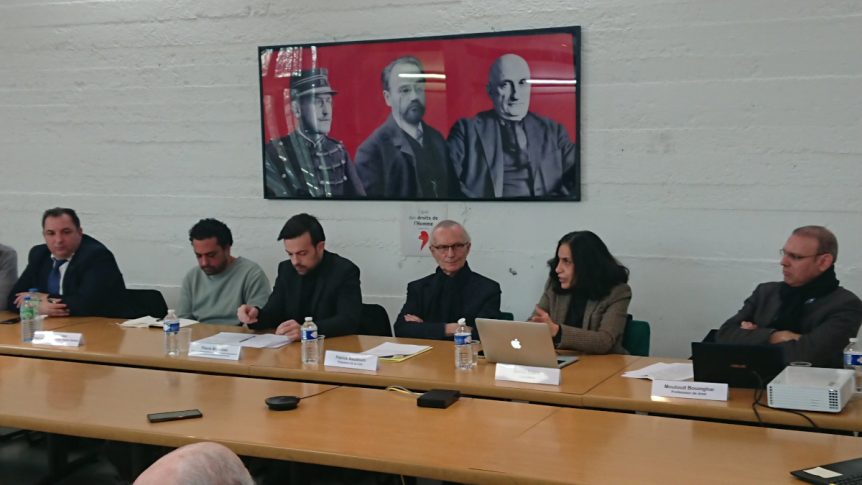Marking the fourth anniversary of Algeria’s prodemocracy movement Hirak, activists and representatives of nongovernmental organizations gathered in Paris on 21 February for a press conference titled ‘On the Human Rights Situation in Algeria: Four Years After the Beginning of the Hirak’. The conference drew urgent attention to the deteriorating human rights situation in Algeria, which has severely undermined the country’s democratic transition and the rule of law. Hosted and co-sponsored by the League of Human Rights (Ligue des droits de l’Homme – LDH), the conference was also made possible by the Cairo Institute for Human Rights Studies (CIHRS), the International Federation for Human Rights (FIDH), EuroMed Rights, Amnesty International, and Human Rights Watch. Patrick Baudouin, President of the LDH, opened the event.
All people in Algeria are potential targets of widening repression that has now reached its most severe stage in recent years, warned Zaki Hannache, an Algerian Amazigh human rights defender as he spoke at the conference. Hannache has documented at least 12,000 arrests by security agents since the Hirak began on 22 February 2019. Prisoners of conscience or arbitrarily prosecuted persons highlighted during the event include Abdel Raouf Rasslane, lawyer and human rights defender; Al Hadi Lasoula, university professor; Ihsane Ilqadi, journalist; and Djamila Louakil, activist and journalist; and Kaddour Chouicha, member of the Algerian League of Human Rights and trade unionist.
The Algeria government’s intensifying authoritarian practices are spearheaded by the executive authority, which systematically harnesses the judiciary together with legislation with the intent of effectively eliminating any exercise of the fundamental rights to free expression, association, and assembly. The judiciary is increasingly pressured by the executive to harass peaceful dissidents in the country, using a legislative arsenal that allows, in some cases, to qualify them as terrorists. Pretrial detention, which is intended to be exceptional, has become regularly used to target journalists, Hirak activists, and trade unionists, explained professor of law Mouloud Boumghar. In this context he called on the Algerian authorities to release the critically-ill Algerian Christian-Amazigh activist Slimane Bouhafs. Boumghar also emphasized that the expanded definition of terrorism (by ordinance on 8 June 2021) and Article 87 bis 13 of the Penal Code puts at risk of prosecution any citizen who expresses a critical opinion of the regime. Independent civil society organizations also are subject to the widening net of prosecution and intimidation. Saïd Salhi, Vice-President of the Algerian League for the Defense of Human Rights (LADDH), spoke of his organization’s dissolution, which he believes was in retaliation for the LADDH’s commitment to change during the 2019 Hirak uprising. Independent press in Algeria is also critically imperiled, as discussed by Pierre Brunisso, lawyer at the Paris bar and member of the International Collective of Lawyers for the defense of Ihsane El Kadi.
All international tools and mechanisms will be activated to support the ever-increasing number of activists and civil society members targeted by the Algerian government, said Mazen Darwish, Secretary General of FIDH. He affirmed that ‘the international human rights movement is not as weak as some states believe’.
Karim Salem of CIHRS closed the conference with a call for robust action from the United Nations Human Rights Council, including the adoption of a resolution establishing a fact-finding mission on Algeria or a special rapporteur to ensure evidence of violations is gathered with a view towards accountability.
Share this Post

